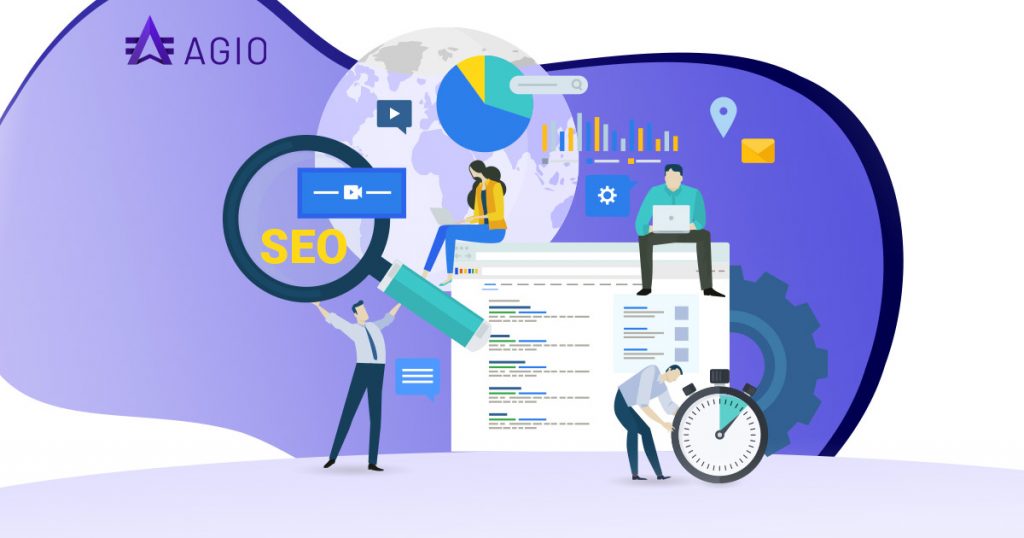Learn How To Track Your Website’s Search Engine Rankings To Understand How Your SEO Progress


After a lot of patience and hard work, you have finally created a new website for your firm to welcome hordes of new clients. But if people can’t figure out your new website, how will they know what you have to offer? So here you will get a chance to know about the new website SEO process.
That is why, for more than 20 years, search engine optimization (SEO) – the acquisition of traffic via search engines has been such an essential issue for website owners. Organic traffic is commonly referred to as the lifeblood of many websites.
Table of Contents
What Is SEO/ Search Engine Optimization?


SEO or ‘search engine optimization is the website SEO process of enhancing your website to increase its range of vision for the product and commodities your business sells in search engines like Google and Yahoo.
However, Google accounts for 90% of all searches. Scan engines simply go out and carefully search the web for sites to index in their catalog. It’s like having a book with an index at the end that tells you where everything was discussed and where.
That pretty much sums up Google and their indexing technology on the web in the cloud.
But how does Google decide what goes on the first page? The most important element is relevance. When someone searches Google, you want to make sure that your website is exactly what they’re looking for.
In their algorithms, Google considers over 200 criteria to decide what is relevant. Aside from relevancy, you should also ensure that your site is beneficial. All of this implies that when a person visits your website, the information they need is simply accessible.
How SEO Functions?


Bots are used by search engines such as Google and Bing to crawl websites, traveling from site to site, collecting information about those pages, and indexing them. Consider the index to be a massive library where a librarian may pull up a book (or a web page) to assist you in finding exactly what you’re searching for at the time.
Following that, computers examine pages in the index, taking hundreds of ranking criteria or signals into consideration, to decide the order in which pages should show in search results for a particular query.
The search algorithms are intended to expose relevant, authoritative pages and give visitors a quick and easy search experience. By website SEO process Keeping these elements in mind while optimizing your site and content will help your pages rank better in search results.
Why Is SEO An Important Aspect In Marketing?


Each year offers new difficulties and adjustments to stay on top of search engines. And, while the website SEO process is a challenge for many organizations and SEO marketers, the rewards are so compelling that we can no longer ignore them.
- SEO regularly generates high-quality leads for your company. According to studies, 60% of marketers believe that SEO is the best source of leads for their company. Because SEO focuses on boosting online traffic for your website, whereas lead generation focuses on increasing the number of clients and prospects for your company.
- SEO brings the return of investment (ROI) to your business. It helps you build a comprehensive and ideal consumer journey for your potential buyers and clients.
- Using tactics like search engine optimization or SEO improves targeting and conversion rates. We all know SEO is mainly used to attract visitors to view your product and services on your website. As a result, it is an effective lead-generating strategy.
- It is important to produce in-depth content for search engines. All thorough material will portray you as an industry leader, which will help you increase your conversion rate and generate backlinks for your firm, both of which will benefit your ranking.
- SEO provides long-term benefits to your company.
SEO Tactics & Strategies To Get Your New Website Ranking


The world of SEO may be intimidating and overwhelming for many individuals and company owners. What appears to be a simple notion might, with a deeper investigation, become extremely complicated and take years to perfect.
Similarly, it might take some time for new websites to develop traction and establish themselves using effective SEO tactics. New search patterns, changing sectors, and regular changes in technology and Google Core upgrades might make it difficult for new domains to gain traction.
Website SEO process for new websites is an important marketing issue since it is critical to get your site recognized early and to begin bringing in traffic as soon as feasible.
Sometimes it takes time to get results in search optimization. For new websites, it can take a bit longer than expected by indexing bots used by Google to start climbing the ranking. So, the question is, how can a new website develop a new SEO strategy?
Let’s discuss the different types of SEO. On-page SEO and Off-page SEO.
On-Page SEO


This type of SEO is the website SEO process of optimizing individual pages to achieve a higher position and more relevant organic traffic.
-
Begin Your Title Tags With Your Desired Keyword
Your company/product may appear at the top of the Google search results page for the relevant term, directing a large quantity of traffic to your website. On the contrary, a poorly chosen or unsuitable keyword might make your site’s chances of success more remote than ever.
A keyword-rich title has more weight than Google. In general, the term has greater weight with search engines if it is near the beginning of the title tag. You may see this in action by searching Google for the competitive keyword.
As you can see, the majority of pages that rank for competitive keywords carefully positions them at the start of their title tags. Although not required, it is smart to do so because it will increase the relevance of your website to what people look for.
-
Drop A Keyword In The First 100 Words
The best spot to begin inserting keywords in an article is inside the first 100 words. Many people come easily with these, however, a big percentage of bloggers prefer a long introduction before dealing with a keyword. This is not recommended for obvious reasons, such as Google’s lack of relevance in search results.
Placing a keyword at the beginning of the post allows Google to comprehend the topic better and the relevancy of the piece.
-
Use Outbound Links
Outbound links are the most effective way to increase traffic to your website. Many individuals make the mistake of not providing links to other websites/articles.
Outbound links demonstrate to Google that the article is both genuine and informative, which are both necessary for ranking.
As a result, if you aren’t already, make sure to include outbound links in each of your posts. Just make sure the links are related to your content and come from reliable, high-quality sites.
-
Write Explaintory & Attractive Meta-Description
Along with your title tag and URL, meta descriptions are one of the most essential and visible components that persuade visitors to click through.
If you want people to read your current post and visit your website, make sure the meta descriptions are appealing and useful. Within the 150-word limit, they should pique the viewer’s interest.
Remember that you, too, may click on a certain result after reading its meta description. The same mindset applies to your audience. Pay attention to the meta descriptions, and the results will come to you organically.
-
Include Targeted Keywords In The URL
The most important backbone of on-page SEO is keywords. It is a step that should not be missed and pay closer attention to it. There is zero possibility not to include your targeted keywords in the URL. The inclusions have their benefits.
When you incorporate the desired keyword into the URL, you provide Google another reason and method to consider your content more relevant for a certain term.
-
Strategically Use The Following Keywords Within Your Post
Strategic keyword placement is important to the success of a post and the network traffic of a website. As search engines get more sophisticated, it is no longer sufficient to simply pack articles with keywords and hope for relevance in the search results.
-
Long-form Content
Longer content has been found in studies to aid with Google ranking. Every piece should aim for a word count of about 2000 words, with a minimum of 1000 words. This would result in long-tail traffic, which would increase the exposure of your site.
Longer content not only allows for more keywords to be included but also places a natural focus on information. Longer language enhances the legitimacy of a post, which means Google will see it as more relevant than shorter and succinct material.
Because long-tail keywords are increasingly associated with search patterns, a lengthier text increases the likelihood of your article/website appearing on a search engine than others.
Longer language enhances the legitimacy of a post, which means Google will see it as more relevant than shorter and succinct material. Because search patterns are increasingly synonymous with long-tail keywords, a lengthier text increases the likelihood of your article/website ranking better than others.
When writing an article that you want people to read, remember to do your research before writing the first word. Before you begin, make sure you have all of the necessary information. Good research leads to flare, which leads to lengthy and thorough writing.
The ideal work is both intricate and linguistically correct.
-
Use Internal Linking
Internal linking is important for lowering a website’s bounce rate and optimizing it since it connects the different pages of a domain. When link juice is disseminated, users/viewers stay on the page for longer periods, and site traffic grows. It enhances the user’s navigating experience.
The bounce rate is calculated by counting the number of people who visit only one page and then leave. Internal linking that is simple and easy to use will automatically reduce this since readers will be led to other related content.
However, it is suggested not to overdo it. It is recommended to post at least 2-4 old links whenever you publish a new blog or an article.
-
Optimize Images
images on your website should have the name of the file which includes the targeted keyword. Additionally, your target term should be included in the Alt Text of your image. This will enhance your article’s SEO and provide search engines with a clearer image of the relevance of your article/page.
Images are a crucial part of every website since they make pages both aesthetically appealing and useful. Optimizing your pictures should increase your ranking naturally. In addition, your image will be ranked highly in Google image search.
-
Concentrate On Long-Tail Keywords
Long-tail keywords are more detailed (and generally longer) searches than more traditional “head” keywords.
Long-tail keywords are less competitive and more targeted than short-term keywords. If you have just begun your SEO strategy for a fresh new website, then I would recommend focussing on long-tail keywords.
The fact is that your new website cannot be ranked with a one-word keyword. Trying to rank your new blog for “SEO” is nearly impossible.
Remember to keep the term as long as feasible and to utilize Google’s keyword planner to select a relevant keyword for future references.
The topic of how to increase search engine ranking is often asked. Yet many people overlook the importance of keywords as a major contributor to traffic and rankings.
-
Make Sure Your Website Is Fast
A slow website is not only bad for users but also for SEO or search engine optimization. A slow website can make your website rank low in search engine results. There are numerous methods for improving the performance of your website.
VPS hosting is arguably the best option because it is “in the cloud” and dispersed across several machines. To optimize images for inclusion on your website, use Photoshop or Gimp.
-
Mobile-friendly Websites Is Important
Mobile-friendly websites should be pictures on devices like smartphones or tablets in a user-friendly technique. It means when a user opens a website on his smartphone. So they should have no problem zooming in on the content and clicking on the link.
This is called responsive website design. A responsive website provides the greatest user experience across all devices and has various advantages. With most businesses experiencing an increase in mobile traffic to their websites, many people are rushing to make their sites accessible.
Off-Page SEO
Off-page SEO refers to tactics that extend outside the confines of a website. This type of website SEO process is commonly associated with link building, but it is much more than that.
-
Only Create High-quality Backlink
Link building is the most crucial and most difficult SEO technique. The reality is that if your website lacks high-quality backlinks, it will not rank for competitive and high-traffic keywords.
The websites with the most useful and relevant backlinks will eventually rank higher than the others. The hard aspect is obtaining those high-quality backlinks.
-
Broken-link Building
The key goal is to replace the broken link with an active one that points to your content. Because no one wants broken links on their website, this approach provides a huge potential for SEO link development.
-
Method Of Guestographics
Another infographic-based link-building strategy. Instead of posting an infographic and urging others to share it, you encourage them to release it on their site in exchange for original material.
-
Guest Posting On Related Blogs
The benefits of guest posting are obvious:
- You obtain backlinks from authoritative sites.
- People look up to you as an expert.
- Your site receives a rush of targeted referral visitors.
If you want to write a guest post for a popular site, do your homework before submitting it. Follow up on all comments in a timely and thorough manner by contacting them back. If you have a fantastic pitch prepared, be sure to share it with the blogger who will be hosting the guest post.
-
Answering To Questions On Quora
Quora is a website where people create all of the material. They ask queries in forums, and other users respond. It’s essentially a social network similar to Yahoo Answers that functions similarly to an online forum.
Threads and responses can both earn “upvotes,” which indicate that the answer was worthwhile and popular. The replies with the most upvotes are shown at the top of the topic.
-
Commenting On Blogs
Commenting on blogs aids in the creation of backlinks, which in turn increases traffic to your blog. Regular commenting is the most effective method to engage with any blogger on a personal level. Comments user-contributed content will help new blogs be ranked quicker.
It may take some time to establish these links, but you will be recognized by the site’s administrator.
-
Participate In Social Media
Although Google does not give much emphasis on social media in terms of ranking. But being active on Facebook, Google+ or Twitter can really increase your site’s popularity and traffic. The more you share the links of your blog on social media. The more likely it is that other people will visit your site, which will increase traffic.
-
Promote Your Blogs
The more you advertise, the more relevant your blog is presented, and its popularity increases. Reach out to a popular blogger in your field before posting your new piece of content. Make the material into a video if at all feasible to reach a new audience.
-
Keep Yourself Updated With Google’s Algorithm
Google’s search algorithm is constantly updated, which can have a major impact on site ranking. Google recently phased away right-column advertising and replaced them with 4-ad top blocks on many commercial searches. This kind of modification must be recognized to develop a future site ranking strategy.
-
Follow Google’s Guideline
Google offers standards for avoiding deception or manipulation. Google is the most well-known and effective search engine available.
Conclusion
To summarise, while web pages are vital for our companies and recognition, it is the keywords and, more significantly, the ranking that determines whether we are significant or not.
To keep your name in the business, make sure your website is relevant to the user’s search parameters. In short, what Google considers remarkable, website SEO process or credible is accepted by the general public.









